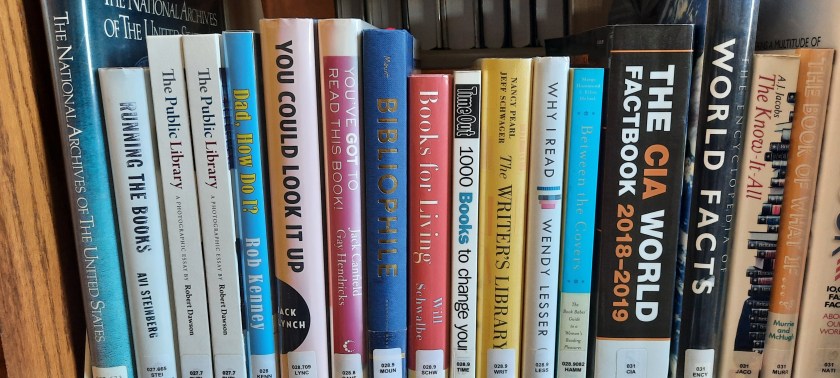My annual Reading Challenge over at Goodreads is set at 24, a goal I can Usually meet with ease. This year, however, I have added a new objective: read one book from each section (there are 10) of the Dewey Decimal System. I love non-fiction, so it didn’t seem like much of a strain to accomplish, but as I reviewed the System, I’m realizing there’s a lot more there than meets the eye.
What did we do before a common system of classification was used in the library? It must have been a real pain, especially for someone who was the slightest bit OCD. Enter Melvil Dewey, who had been arranging his mother’s pantry goods since he was a little boy. In 1873, at the age of 25, Dewey patented the decimal system that bears his name, and it began to be implemented in 1876. Called the Dewey Decimal Classification (DDC), it is built around ten main classes, ostensibly covering the entire world of knowledge.

Each main class is divided into ten more divisions, each having ten divisions of increasing specificity. It is “arranged by discipline, not subject”, so a topic can be all over the place. Given that there are ten main classes, one hundred divisions, and one thousand sections still makes it a bit unwieldy, but the handy-dandy card catalogue became my good friend when trying to do research, as it pulled together the subject of research in a coherent fashion. I mean, seriously, there is a Lot of Knowledge in a library…
I decided to start at Willard Library, partly because it is my very favorite library ever, but I also thought it would be easier to choose a book with less inventory. The 000-100 section is really a lot of reference books, also newspapers, periodicals, Guinness Book of World Records, etc. and it didn’t leave me much choice, so I chose a book called “An Uncommon History of Common Things”. Meh. The Things were common, but I didn’t find their history so uncommon. Does anyone read a book like that all the way through, beginning to end? I don’t, kids, so I skimmed through and it’s ready for return — and it counts as a read, by my rules — and I make the rules here.
More interesting than the book I chose is what I learned about Melvil Dewey, a true example of not judging a book by its cover. In addition to devising the Decimal System, he helped found the American Library Association and the first library school at Columbia University in 1884; he was also the New York State Librarian from 1888-1906. When Columbia University balked at admitting women to the Library School, he started his own school with 17 women and the help of other female teachers. Seems like a real forward-thinking guy for the feminists, right?
Wrong… Melvil Dewey has also been called a misogynist, racist, and anti-Semite. While some biographers credit Dewey with being a champion of women in the workplace – he called for greater employment of women in libraries when most women worked as domestics- it is difficult to grant him that title when multiple women accused him of sexual harassment. He was fired from his NY State Librarian because of his very public refusal to allow Jews to be included in a country club he founded. He paid off several of the women (there were many) who brought charges against him for sexual harassment. In fact, his worldview influences his decimal classifications as he neglected to include any Black history or writers within it. You can notice right away that in the Religion section, 9 of the 10 subcategories are Christianity, with only 1 for “other religions”. Librarians began the work of “decolonizing” the categories quite a while back, and the Library of Congress uses a completely different system that is similar, but more open to changes.
Anyway, I’m ready for the 100s now, Philosophy…just one book? I learned everything I know about Philosophy from watching “The Good Place”…well, almost everything, but you should watch it if you get a chance. (It doesn’t count on the reading challenge.)
I decided to vary the library I visit, so throughout the month of January you may see me lurking at any of the branches, looking for the card catalogue.
We’re off for a Sunday Drive.
Peace
Discover more from The News from Sonnystone Acres
Subscribe to get the latest posts sent to your email.


Oh dear, philosophy. I have a degree in philosophy and then read the want ads one day, only to realize my mistake. If you HAVE to read philosophy, I’d go for something a bit off the beaten path like Merton’s The Seven Story Mountain. Good luck!
LikeLike
A degree in Philosophy sounds very serious! I have read Merton’s Seven Story Mountain in the past, slowly, marking it up with highlighter. Re-reads count, though. I’m curious what the Big Library offers. I’m sure more choices will not help me and I’ll be hours deciding, finally walking out with two or three… In the meantime, I’m reading a quick cozy mystery–requires very little thinking!
LikeLike